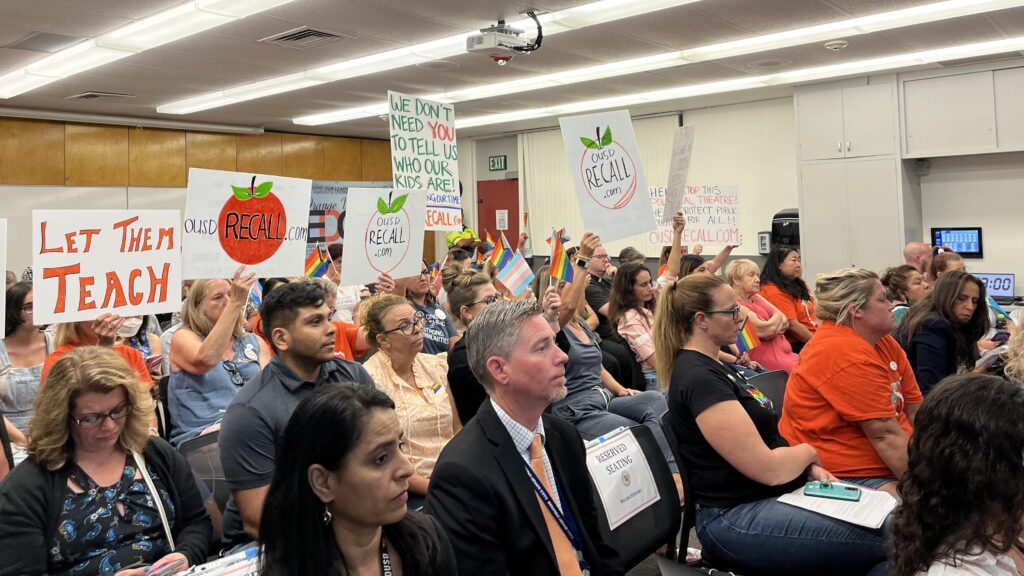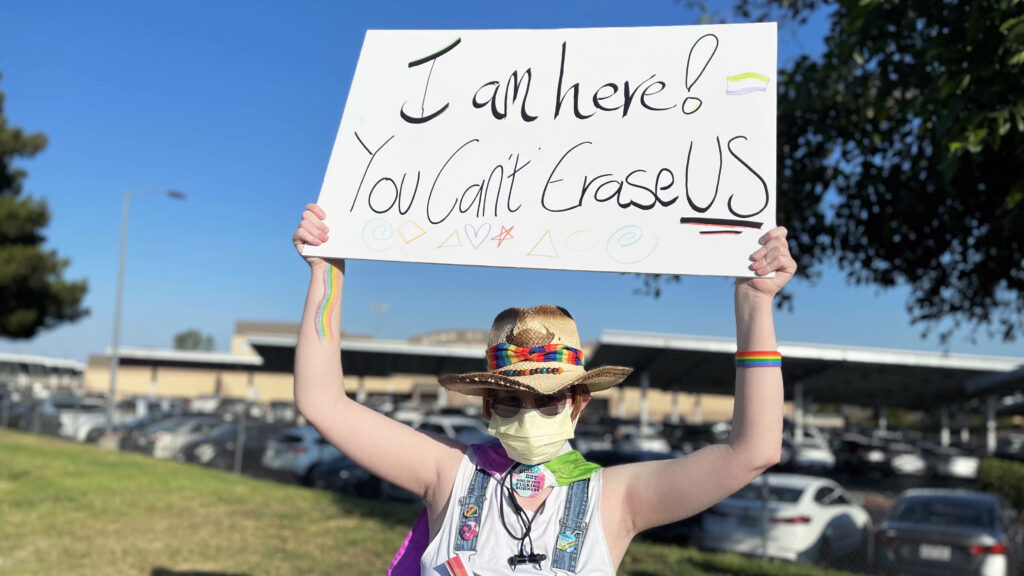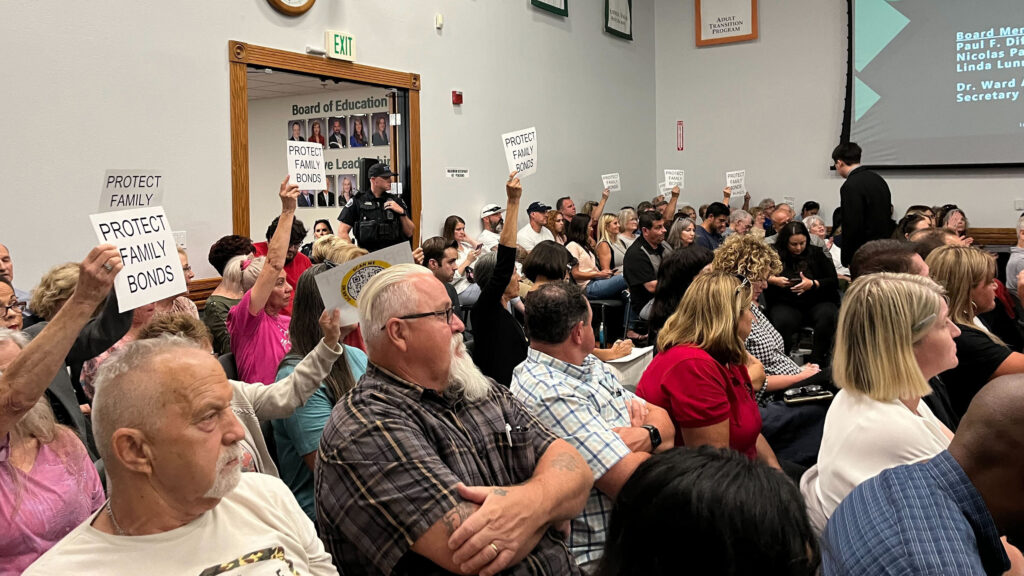
Packed crowd anticipates discussion on Orange Unified Parental Notification Policy on Sept. 8, 2023.
Credit: Mallika Seshadri / EdSource
In a unanimous 4-0 vote, the Orange Unified School District passed a policy Thursday evening that would require school officials to notify parents and guardians if their child asks to use a name or pronoun different than what was assigned at birth, or if they engage in activities and use spaces designed for the opposite sex.
The policy, which has now percolated through a half dozen California districts, has its origins in Assembly Bill 1314, proposed by Assemblymember Bill Essayli, R-Riverside, which was denied a hearing at the state level in April.
Rocklin Unified School District passed such a measure Wednesday. Previously, Temecula Valley Unified (Aug. 22), Anderson Union High School District (Aug. 22) Murrieta Valley Unified (Aug.10) and Chino Valley Unified (July 20) passed almost identical policies.
The policies passed by Chino Valley Unified and Murrieta Valley Unified have garnered backlash from state officials – who called the decisions a violation of students’ civil rights and have initiated an investigation into Chino Valley Unified. A Superior Court judge in San Bernardino County has also temporarily halted Chino Valley Unified’s policy.
It would specifically require parents and guardians to be notified if their child asks to use a different name or set of pronouns, or if they ask to use a different sex’s segregated spaces, such as bathrooms or locker rooms.
The policy would also mandate school principals be informed of pupils experiencing gender dysphoria or gender incongruence.
District officials would be required to tell school principals or counselors if a student makes any attempt or threat of suicide. The principal would then have to seek out medical or mental health treatment for the student, ensure that they are supervised until their parents, guardians or another support agency intervenes, and notify emergency assistance – such as law enforcement – if necessary.
Verbal and physical altercations, along with complaints of bullying, would have to be relayed to parents within three days.
But the policy’s opponents say denying student’s a source of support at school – especially if they come from toxic home environments and non-accepting parents – could exacerbate their mental health.
“When our lawmakers fail, when our families don’t accept us, when our friends leave us…I just want to feel safe at school,” said an Orange Unified School District high school student at the previous Aug. 17 meeting.
School Board Member Angie Rumsey said the majority of teachers would also back the policy.
“As a [someone in education], I hold and hide nothing from the parents of my students. The relationship begins with a realization that, as the teacher, I am not going to hide anything or keep information from a parent,” Rumsey said during the meeting. “Teachers should communicate with parents regarding any change in behavior.”
However, before the Aug. 17 meeting, the Orange Unified Educators Association released a letter, arguing the policy would violate various aspects of California law as well as “student privacy rights grounded in the California Constitution.”
The union added that the policy would burden teachers with the difficult task of discussing sensitive issues about their students with parents.
“In addition to the legal issues, this policy requires certificated employees to have the appropriate knowledge, training, and time to have communication with students and guardians about sensitive and confidential issues,” the letter stated.
“With the number of requirements and expectations already placed on certificated staff, this is an unreasonable and highly concerning expectation.”
Thursday evening, California Attorney General Rob Bonta also issued a letter to the board opposing the measure.
The school board meeting was heated – and dozens of activists spoke passionately for the measure, including many who didn’t have a direct connection to the district.
The three board members who opposed the policy walked out of the meeting before the vote, following a disruption.
“There’s a chilling effect that occurs for folks who then are unsure about what they can say and not say or what they’re required to do, and…. it creates a lot of stress on top of what is already a very stressful job for teachers,” said USC Professor of Education Julie Marsh.
“…But the broader ripple effect is that you know, might it dissuade potential teachers from actually going into the teaching profession.”
The policy
Orange Unified School District is now the sixth district in California to pass a policy that would require parental notification when students show signs of being transgender.
The district had originally considered that same policy at its meeting on Aug. 17, but Thursday’s agenda included a version where school counselors or psychologists would be informed instead of parents and guardians.
The board ultimately decided to revert back to a parental notification policy between Thursday’s closed and open sessions.
In response, several board members objected to discussing the item and tried to postpone the vote to a later meeting, after the Superior Court heard arguments for Chino Valley on Oct. 13. Those board members also claimed that they did not have enough time to adequately review the policy.
The version that ultimately passed reverted back to the policy’s original intention.
After the proposed AB 1314 was denied a hearing at the state level, Essayli – who spoke at Thursday’s meeting – vowed to bring it to local districts and encouraged parents to pursue litigation.
“In a state like California… a blue state, it becomes really the only option for these kinds of policies and actions to be occurring,” Marsh said. “And it shows us that we’re not immune.”
The protocols outlined in the policy in response to bullying and threats of suicide have become a common argument in favor of its passage – but detailed policies and protocols to support students through these challenges already exist in Orange County and other districts.
The 2023 Lead-Up at Orange Unified
January – The new Orange Unified School Board fired then-Superintendent Gunn Marie Hansen during a closed session meeting without a stated reason. She was out of the country at the time. Angered by that board decision, parents have dubbed that night the “Thursday night massacre.”
Later that month, the board suspended the district’s digital library in response to parents’ complaints about the book “The Music of What Happens.”
February – Orange Unified School District’s interim superintendent Edward Velasquez resigned after one month in the position.
The board also faced a Brown Act complaint for allegedly not providing enough notice prior to a meeting, among other claims.
March: The district faced two lawsuits about alleged Brown Act violations as well as one from parents about the Superintendent firing.
June – The Orange Unified School Board adopted a policy that would ban Pride flags and other flags, calling them divisive.
August – The OUSD School Board appointed Ernie Gonzalez as its new superintendent and held an initial discussion of the new parental rights policy that would require school staff to inform parents if their child indicates they are transgender.
For the past several months, community activists have been calling for a recall of Board Members Rumsey, John Ortega, Madison Miner and Rick Ledesma, the president.
“All that we’re seeing in Temecula and Chino and Orange and other places around the state are examples of the same thing, where we’ve got a very concerted effort that started with trying to elect conservative members to the board to get a majority and to then advance policies that are more conservative in nature,” Marsh said.
“Some would argue it’s a politics of distraction to distract us from the core work of what schools are supposed to be doing around teaching and learning. And others would even go further to say this is an explicit effort to undermine public confidence in the public school system.”
Marsh added, “I feel like it’s a wake-up call for folks to just pay a little bit more attention to school boards.”






